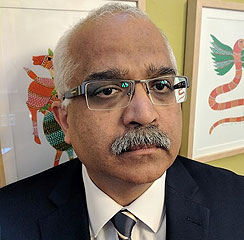Award for Regulatory Studies Development
Focusing on senior scholars and complementing the Giandomenico Majone Prize, the Standing Group Award for Regulatory Studies Development bestows recognition on a senior scholar for outstanding contributions to the development of regulation and governance studies.
This may include promoting a new teaching initiative, opening a new research sub field, delivering crucial publications or making a significant public contribution to the field (i.e., a large dataset, a new RIA technique).
More information on the nomination and selection procedure can be found in the Regulations of the Standing Group Award for Regulatory Studies Development.
The previous winners of the Award are:
- 2023: David Vogel
- 2021: John Braithwaite
- 2018: Aseem Prakash
- 2016: Julia Black
- 2014: David Levi-Faur
2023: David Vogel

David Vogel is the winner of this year’s Regulatory Studies Development Award.
David is the Soloman Lee Distinguished Professor Emeritus of Business Ethics at Berkeley Haas and Professor Emeritus of Political Science. He has published extensively on both environmental management and government regulation.
Over decades David has made major contributions to regulatory studies. His path-breaking publications include National Styles of Regulation (1986), The Politics of Precaution (2012) and California Greenin’ (2018). In these books, and in many other academic outputs, David did not only manage to sketch out broad empirical patterns, but also analysed the historical provenance of regulatory regimes to extract the maximum analytical leverage from them.
To illustrate, David’s monograph National Styles of Regulation describes in great detail the history and development of environmental regulation in Britain and the United States. On basis of this description, he condensed two styles of regulation, deeply rooted in the political culture and societies of these distinct political systems. In doing so, David defies the common sense assumption that the stricter regime in the United States is more effective than the more lenient British regime. This book certainly laid the ground for a comprehensive research programme on regulatory styles.
A more recent example is David’s book The Politics of Precaution in which he compares risk-regulatory regimes in the European Union and the United States. He finds that the European Union and the United States changed their position here: While the United Stated often – up until the 1990s – had adopted stricter standards than policy makers in the European Union, EU standards are nowadays often more ambitious than those across the Atlantic. In his insightful and detailed comparison David not only identifies key drivers of this change, but also explores the causal mechanism through which the EU exports its standards globally.
These are only two examples of how David Vogel contributed to the development of the field and prepared the ground for research programmes in regulatory governance.
2021: John Braithwaite

John Braithwaite is a Distinguished Professor Emeritus and Founder of the Regulatory Institutions Network at the Australian National University.
He is a criminologist whose empirical and theoretical research on corporate crime and regulatory governance has been highly influential in developing the interdisciplinary field of regulatory governance.
John’s remarkable research output includes hundreds of articles, book chapters, edited volumes and authored books across an unusually wide spectrum of empirical and theoretical inquiry. His most important works are Responsive Regulation (with Ian Ayres, 1992), Global Business Regulation (with Peter Drahos, 2000) and the sole-authored Regulatory Capitalism (2008).
Amongst the core concepts in the field of regulatory governance which John has led (often collaboratively with other key scholars) on developing and applying are ‘responsive regulation’, ‘reintegrative shaming’, ‘meta-regulation’ and ‘regulatory capitalism’.
Since 2004 he has substantially focused his research on comparative peace building applying a similar theoretical lens, and equal theoretical rigor, empirical insight and humanity to major societal challenges associated with supporting global efforts to secure peace in some of the most troubled parts of the globe.
In addition to his path breaking and highly influential scholarship John has been a leader in building the field of regulatory governance, establishing the Regulatory Institutions Network at Australian National University, supervising and mentoring countless students and researchers, both formally and informally, building engagement between his research and numerous practice fields and as a founding co-editor of Regulation & Governance.
At the 2021 Biennial Conference, following the presentation of the award, John Braithwaite gave the Regulatory Studies Award Lecture, “Beyond Realist International Relations Theory in Governance of Global Crises”. You can view the presentation and lecture here.
2018: Aseem Prakash
 Professor Aseem Prakash has been awarded the 2018 Standing Group Award for Regulatory Studies Development. The 2018 award was a piece of sculpture crafted in 6,000 year old Irish bog oak by artist Michael Casey, entitled ‘The Salmon of Knowledge’.
Professor Aseem Prakash has been awarded the 2018 Standing Group Award for Regulatory Studies Development. The 2018 award was a piece of sculpture crafted in 6,000 year old Irish bog oak by artist Michael Casey, entitled ‘The Salmon of Knowledge’.
Aseem Prakash has been a leading innovator in the fields of environmental regulation, private governance, and nonprofit accountability. He is Professor of Political Science, the Walker Family Professor for the College of Arts and Sciences, and the Founding Director of the Center for Environmental Politics at University of Washington, Seattle.Aseem is the author of Greening the Firm: the Politics of Corporate Environmentalism (Cambridge, 2000), the co-author of The Voluntary Environmentalists: Green Clubs, ISO 14001, and Voluntary Environmental Regulations (Cambridge, 2006), and a co-editor of numerous edited volumes. In addition to guest-editing several journal symposia, he has published in leading journals of political science, international relations, public policy, legal studies, nonprofit studies, and business.
He is also the General Editor of Cambridge University Press Series in Business and Public Policy and the Associate Editor of Business & Society, and he serves on the editorial board of several journals including Regulation & Governance, Public Administration Review, International Studies Quarterly, and Nonprofit & Voluntary Sector Quarterly.
Aseem is a member of the U.S. National Academies of Sciences, Engineering and the Medicine’s Board on Environmental Change and Society. He is also an International Research Fellow at the Center for Corporate Reputation, University of Oxford, and serves on the Economic Development Commission of the city of his residence: Edmonds, Washington.
Aseem Prakash was elected to the position of the Vice President of the International Studies Association for the period, 2015-2016. His awards include the International Studies Association International Political Economy Section’s 2019 Distinguished Scholar Award that recognizes “outstanding senior scholars whose influence and path-breaking intellectual work will continue to impact the field for years to come” as well as the Association’s 2018 James N. Rosenau Award for a “scholar who has made the most important contributions to globalization studies.”
2016: Julia Black
 Professor Julia Black is the winner of the 2016 Standing Group Award for Regulatory Studies Development.
Professor Julia Black is the winner of the 2016 Standing Group Award for Regulatory Studies Development.
Julia Black is Pro Director for Research and Professor of Law at the London School of Economics and Political Science. Moreover, she is currently Interim Director of the LSE. She is also an independent member of the Board of the Solicitors Regulation Authority and was elected as a Fellow of the British Academy in 2015.
Julia completed her first degree in Jurisprudence and her DPhil at Oxford University, and joined the Law Department of the LSE in 1994. She has been a visiting fellow at the University of Sydney, All Souls College, Oxford and in 2014 was the Sir Frank Holmes Visiting Professor in Public Policy at the Victoria University, Wellington, NZ. She is also a research associate of the LSE & ESRC Systemic Risk Centre and LSE’s Centre for the Analysis of Risk and Regulation (CARR), and co-chairs CARR’s Regulators’ Forum.
Julia Black has received grants from the British Academy & Leverhulme Trust, the ESRC and the Canadian SSRC. She is General Editor of the Modern Law Review and on the editorial boards of Regulation & Governance and Law & Policy.
Julia has served as an external member on the Education and Training Committee for the Solicitors Regulation Authority in 2013 and joined the SRA Board as an independent member in January 2014. She has been a member of the SRA’s Regulatory Risk Committee and currently chairs the SRA’s Standards Committee. She has advised policy makers, consumer bodies, law reform bodies and regulators on issues of institutional design and regulatory policy in the UK and overseas over many years.
Julia Black is one of the world’s preeminent authorities on regulation, and she has contributed very significantly to the development of socio-legal studies in the field of regulation. Her book Rules and Regulators (Clarendon Press Oxford, 1997) draws attention to the importance of context and community in which rules operate in order to answer the question of ‘how to make rules work’. Setting the theory against an empirical study of the formation and use of rules in the financial sector, she demonstrates complex ways in which a rule and community interact. Julia’s study emphasizes that ultimate abstract conclusions about rules are not possible, rules must always ‘fit’ into the community in which they are to function. This study was very innovative study and was really formative for the type of research Julia Black has been pursuing since then, including her very influential work on principles based regulation.
However, her unusually wide-ranging scholarship extends well beyond understanding of the setting and implementation of rules in financial markets. She has significantly enhanced understanding of the role of institutions in regulatory policy, both theoretically and empirically, and also the centrality of procedures and relationships for giving meaning and effect to regulatory governance. Through this strand of work she has built on and developed some of the most influential theoretical strands of the field, including very influential work on the concept of ‘decentred regulation’ (which set down a path developed by herself and many others on the role of non-state actors and heterarchical instruments in contemporary regulation), her work with Robert Baldwin on ‘really responsive regulation’ and ‘really responsive risk regulation’, and significant theoretical contributions to the challenge of managing legitimacy in regulatory regimes. Substantively, from her starting point in financial regulation, she has addressed significant questions also in the areas of biotechnology, the environment and the regulation of consumer markets and many other policy fields.
Overall, Julia has addressed and advanced many and perhaps most of the key areas of contemporary concern in regulatory governance scholarship and has shared her learning extensively both with scholarly and practice communities.
2014: David Levi-Faur
 Professor David Levi-Faur is the first recipient of this award. He has made successful efforts to create an academic regulatory governance community, as exemplified by his initiative to co-found the ECPR Standing Group on Regulation and Governance in 2005, and looks back on highly impactful research initiatives.
Professor David Levi-Faur is the first recipient of this award. He has made successful efforts to create an academic regulatory governance community, as exemplified by his initiative to co-found the ECPR Standing Group on Regulation and Governance in 2005, and looks back on highly impactful research initiatives.
David Levi-Faur is a professor at the Federmann School of Public Policy and the Department of Political Science at the Hebrew University of Jerusalem. Together with John Braithwaite and Cary Coglianese he was the founding editor of the successful Wiley-Blackwell journal Regulation & Governance. He has held research and teaching positions at the University of Haifa, the University of Oxford, the Australian National University, the University of Manchester and the Free University of Berlin as well as visiting positions at the London School of Economics, the University of Amsterdam, the University of Utrecht and the University of California at Berkeley.
His numerous and much-cited publications include special issues of the Annals of the American Academy of Political and Social Sciences (The Global Diffusion of Regulatory Capitalism, co-edited with Jacint Jordana) and Governance (Varieties of Regulatory Capitalism) and editorships of the Oxford Handbook of Governance (Oxford University Press, 2012) and The Handbook of the Politics of Regulation (Edward Elgar, 2011). Together with Avishai Benish he is editing the working paper series Jerusalem Papers in Regulation & Governance.

